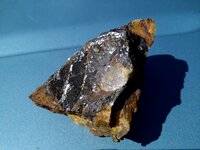MadMarshall
Hero Member
I have a few questions that I am having trouble coming up with the answer too
1. Why do I get a very strong gunpowder smell when hammering on some Rocks.
2. Over time Cracks widen but do they get smaller over time as well..
3. Gold with red stains.. I was wondering if stained gold was a sign of more recently shed gold.. After time does nature and the river clean the gold. Or being exposed to air? or does it always stay stained?
4. Stockwork veins.. Any information all information...
I appreciate the help
1. Why do I get a very strong gunpowder smell when hammering on some Rocks.
2. Over time Cracks widen but do they get smaller over time as well..
3. Gold with red stains.. I was wondering if stained gold was a sign of more recently shed gold.. After time does nature and the river clean the gold. Or being exposed to air? or does it always stay stained?
4. Stockwork veins.. Any information all information...
I appreciate the help




